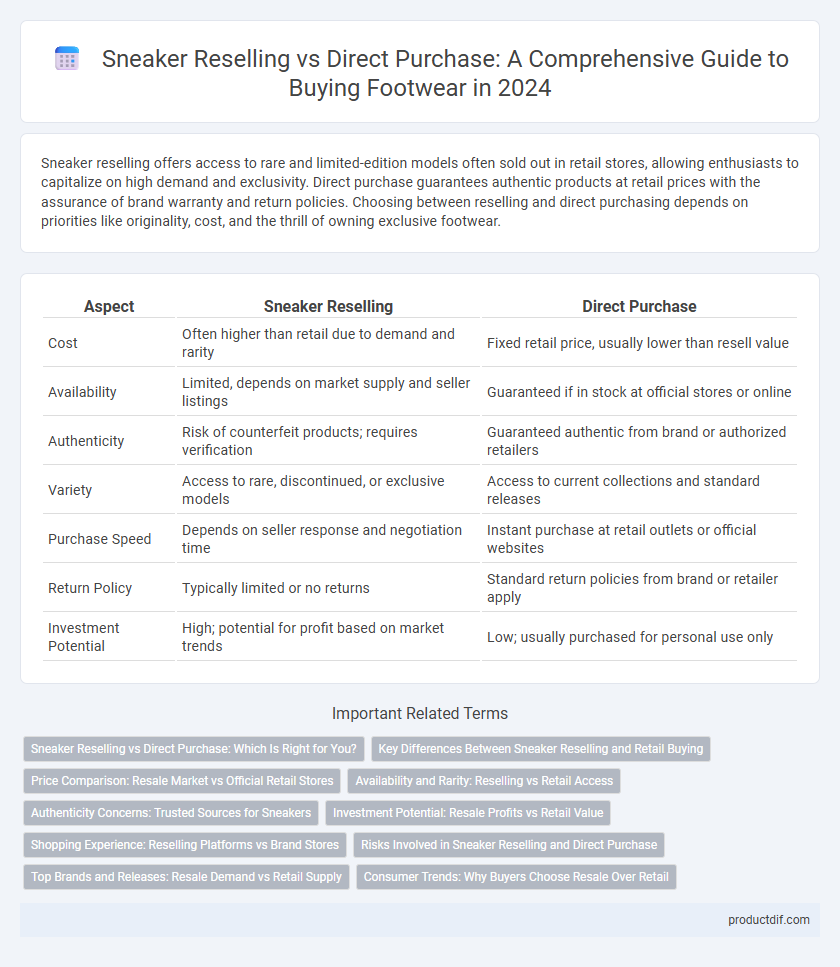Sneaker reselling offers access to rare and limited-edition models often sold out in retail stores, allowing enthusiasts to capitalize on high demand and exclusivity. Direct purchase guarantees authentic products at retail prices with the assurance of brand warranty and return policies. Choosing between reselling and direct purchasing depends on priorities like originality, cost, and the thrill of owning exclusive footwear.
Table of Comparison
| Aspect | Sneaker Reselling | Direct Purchase |
|---|---|---|
| Cost | Often higher than retail due to demand and rarity | Fixed retail price, usually lower than resell value |
| Availability | Limited, depends on market supply and seller listings | Guaranteed if in stock at official stores or online |
| Authenticity | Risk of counterfeit products; requires verification | Guaranteed authentic from brand or authorized retailers |
| Variety | Access to rare, discontinued, or exclusive models | Access to current collections and standard releases |
| Purchase Speed | Depends on seller response and negotiation time | Instant purchase at retail outlets or official websites |
| Return Policy | Typically limited or no returns | Standard return policies from brand or retailer apply |
| Investment Potential | High; potential for profit based on market trends | Low; usually purchased for personal use only |
Sneaker Reselling vs Direct Purchase: Which Is Right for You?
Sneaker reselling offers potential for profit through limited-edition releases and rare models, whereas direct purchase ensures immediate ownership at retail price without markup risk. Resellers benefit from market trends and exclusivity, while direct buyers prioritize convenience and authenticity. Choosing between sneaker reselling and direct purchase depends on your willingness to invest time in market research versus the desire for quick, guaranteed access to sneakers.
Key Differences Between Sneaker Reselling and Retail Buying
Sneaker reselling involves purchasing limited-edition footwear at retail price and selling it for profit, often capitalizing on high demand and scarcity, while direct retail buying focuses on acquiring sneakers for personal use at standard market prices. Resellers rely on market trends, release dates, and exclusivity to maximize resale value, whereas retail buyers prioritize style, comfort, and fit. The key difference lies in the intent: reselling is investment-driven, whereas direct purchase is consumption-driven.
Price Comparison: Resale Market vs Official Retail Stores
Sneaker reselling often involves prices significantly higher than official retail stores due to limited edition releases and high demand driving up market value. Retail stores offer brand-new, authentic sneakers at fixed prices typically lower than resale costs, though stock may be limited. Consumers must weigh the premium resale price against immediate availability and guaranteed authenticity from direct purchases.
Availability and Rarity: Reselling vs Retail Access
Sneaker reselling offers access to rare and limited-edition models often sold out through retail channels, creating higher availability despite premium pricing. Retail purchases provide guaranteed authenticity and standard pricing but are limited by stock constraints and release schedules. The resell market thrives on scarcity, driving demand for exclusive sneakers beyond retail availability.
Authenticity Concerns: Trusted Sources for Sneakers
Sneaker reselling markets often raise authenticity concerns due to counterfeit products, making trusted platforms like StockX, GOAT, and Stadium Goods essential for verifying genuine sneakers. These sources employ rigorous authentication processes, including expert inspections and technology-driven verification methods, ensuring buyers receive authentic footwear. Direct purchases from brand stores or official retailers minimize risks and guarantee product authenticity, providing peace of mind for sneaker enthusiasts.
Investment Potential: Resale Profits vs Retail Value
Sneaker reselling offers significant investment potential by capitalizing on limited releases and high demand, often yielding profits that surpass the original retail value. Direct purchase provides immediate ownership at retail price but lacks the potential for substantial financial gain seen in the resale market. Key sneaker models like the Air Jordan 1 and Yeezy Boost demonstrate how resale profits can exceed retail costs by several multiples, highlighting the lucrative nature of sneaker reselling.
Shopping Experience: Reselling Platforms vs Brand Stores
Sneaker reselling platforms offer a dynamic shopping experience with access to exclusive, limited-edition models not available in brand stores, often at premium prices. Brand stores provide a reliable and straightforward purchase process with guaranteed authenticity, customer service, and return policies, ensuring consumer trust and satisfaction. The choice between reselling and direct purchase balances exclusivity and convenience, heavily influenced by availability, pricing, and buyer preference.
Risks Involved in Sneaker Reselling and Direct Purchase
Sneaker reselling carries risks such as counterfeit products, price volatility, and the potential for unsold inventory, leading to financial losses. Direct purchase ensures authenticity and fixed retail prices but may miss out on limited-edition releases and potential market value appreciation. Buyers must weigh the risk of paying inflated prices against the guarantee of genuine products when choosing between reselling and retail channels.
Top Brands and Releases: Resale Demand vs Retail Supply
Top sneaker brands such as Nike, Adidas, and Jordan often experience high resale demand for limited-edition releases like the Air Jordan 1 and Yeezy Boost 350, where retail supply is intentionally scarce to create exclusivity. Resellers capitalize on this imbalance by purchasing from official drops and selling at marked-up prices driven by hype and scarcity in secondary markets like StockX and GOAT. Consumers deciding between direct purchases and reselling confront trade-offs in price, availability, and immediacy related to these top-tier sneaker releases.
Consumer Trends: Why Buyers Choose Resale Over Retail
Consumers increasingly favor sneaker reselling for exclusive and limited-edition releases unavailable through direct retail channels. The resale market offers access to rare models and unique collaborations, often driving higher demand due to perceived value and scarcity. Buyers prioritize authenticity, convenience of online platforms, and the potential for investment returns, shaping their preference for resale over traditional retail.
Sneaker Reselling vs Direct Purchase Infographic

 productdif.com
productdif.com